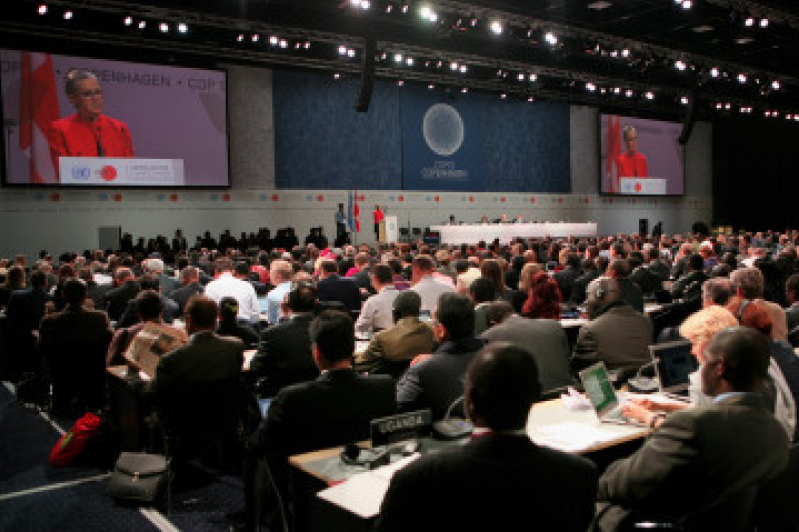
Delegates from 192 countries have gathered in Copenhagen for the high-anticipated U.N. summit on climate change, which seeks agreement on a post-2012 climate change deal that will replace the current Kyoto Protocol.
Over the next two weeks, starting Monday, some 15,000 delegates and 100 world leaders are expected to attend the summit that will focus on reductions in carbon emissions, funds to help developing countries adapt to climate change, and a carbon trading scheme.
Though the results of a Globescan poll released Monday revealed that 64 percent of people around the world regard climate change as "very serious," there is still much skepticism over the global phenomenon especially in light of the e-mail leak from a leading British climate science center last month.
While climate change activists insist that humans are to blame for climate change, e-mails stolen from the climate unit at the University of East Anglia appeared to show some of world's leading scientists discussing ways to shield data from public scrutiny and suppress others' work.
Those who haven’t bought into the climate change hype say the e-mail leak shows that scientists have been conspiring to hide evidence about global warming, which they argue could be caused naturally by changes such as alternations in the Earth’s orbit and solar energy and solar wind output.
On Friday, a senior U.N. climate official said the United Nations was planning to conduct its own investigation into the e-mail leak, saying that U.N. leaders “certainly don't want to brush anything under the carpet."
Despite the leak, a number of groups have been undaunted in their efforts to lobby industrialized nations to cut emissions, which some scientists say is essential to prevent climate disasters, such as coastal flooding from rising sea levels, severe weather events, and variations in rainfall and temperatures that will affect agriculture and wipe out species of plants and animals.
“We must pray for a successful outcome because the whole world is depending on it,” said Daleep Mukarji, director of international development charity Christian Aid.
The U.K.-based leader said it was “urgent” that governments agree on 40 percent cuts in carbon emissions and additional money for developing countries to mitigate the worst effects of climate change.
“We don’t want a fudge,” he said. “We want a ‘FAB’ agreement - fair, ambitious and binding. Fair to developing countries, ambitious on targets, and legally binding so that all countries are signed up.
“If you get targets that are not really controlling global warming then what’s the point?” Mukarji added.
Like many other climate change believers, Mukarji warned that around 600 million people were already vulnerable because of climate change and the world was set to see more extreme weather like droughts, floods and typhoons.
Mukarji said a climate change deal was not only an issue of science but also of justice for people already feeling the impact of climate change.
“God’s people are suffering today because of what we’ve done in the last few years. They are suffering not because of anything they’ve done. It is not right that we allow this to continue,” he said.
In the United States, meanwhile, evangelical scholars have argued that science, contrary to what many leading scientists claim, does not support the claim that increased CO2 in the atmosphere is having a negative effect on the earth.
Rather, they say, no one currently really understands clearly how the earth is responding to the increase in the greenhouse gas.
At a press conference last week, Southern Baptist theologian Craig Mitchell denounced cap and trade legislation – pollution control policy that sets a limit or cap on the amount of pollutants that can be emitted – as “immoral” because it would do serious harm to the world’s poor without guaranteeing that global warming would decrease.
Economist Charles van Eaton, meanwhile, said the cap and trade idea would create a “perverse” market, noting that a market arises spontaneously and the policy would benefit a few but at the expense of the majority.
Despite being divided over the existence and the cause of global warming, the Christian community largely agrees that people have a responsibility to care for God’s creation and, even in America, there is more support than opposition for a policy to set limits on carbon emissions.
According to the Pew Research Center, 57 percent of Americans said that there is solid evidence that global temperatures are rising while 33 percent said they don’t believe that there is solid evidence.
And while only 56 percent of global warming believers say humans are to blame for climate change, half of Americans overall favor setting limits on carbon emissions and making companies pay for their emissions, even if this may lead to higher energy prices. Thirty-nine percent, meanwhile, oppose imposing limits on carbon emissions under these circumstances.
In Monday’s Globescan poll, the world's two biggest polluters, China and the United States, were more ambivalent toward climate change than other nations, with 57 percent and 45 percent, respectively, regarding it as "very serious."
“[T]he mixed opinions in the United States and China suggest leadership in Copenhagen may need to come from others,” Globescan Chairman Doug Miller commented.
The United Nations Climate Change Conference in Copenhagen is set to conclude on Dec. 18.







